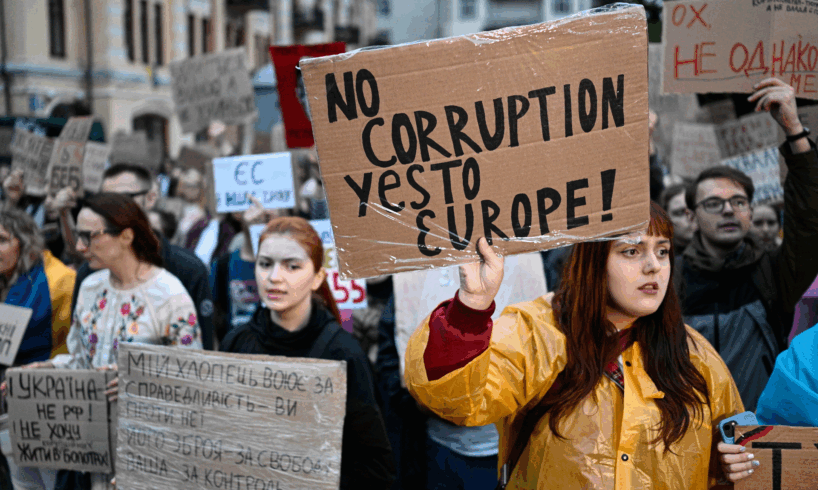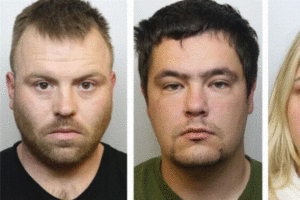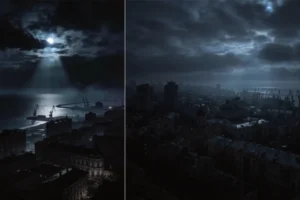
Protestors once again gathered across Ukraine on the eve of a parliamentary vote to reinstate the independence of anti-corruption agencies, which lawmakers curtailed just a week earlier.
The new bill was proposed by President Volodymyr Zelensky after the legislation last week triggered the first protests since the start of Russia’s full-scale invasion.
“For the first time in (almost) four years, the government has made a huge mistake, and we will not forgive them for it,” Yehor, a soldier who did not disclose his surname for security reasons, told the Kyiv Independent, referring to the last three and a half years of Russia’s full-scale invasion.
“I believe in Ukraine, in our people, and in the hope that the government will listen to us and make the right choice,” he said.
In Ukraine’s capital city of Kyiv, demonstrators held signs in support of the two anti-graft agencies that were the target of the legislation — the National Anti-Corruption Bureau of Ukraine (NABU) and the Specialized Anti-Corruption Prosecutor’s Office (SAPO).
Ukraine’s Parliament on July 22 voted to give unprecedented control to the Prosecutor General — a political appointee — over the investigations of NABU and SAPO. The move was widely seen as a response to the agencies’ investigations into the inner circle of President Zelensky.
Protests immediately erupted across the country in response, with civil society groups and Ukraine’s Western partners condemning the move as a rollback of Ukraine’s post-EuroMaidan anti-corruption reforms and a threat to its EU prospects.
The backlash prompted Zelensky to backtrack and submit a new bill on July 24 that would restore the agencies’ autonomy. On July 30, the parliamentary law enforcement committee endorsed the revised bill and recommended its adoption in full during the July 31 session.
While calling on parliament to pass the bill tomorrow, protestors stopped short of placing the blame on Zelensky or demanding his resignation. Sparse chants directed at the president did not appear to resonate with the crowd in Kyiv.
“This is not only about Zelensky — the president holds the power, but he is not the sole source of it,” teacher Pavlo Makeienko told the Kyiv Independent.
“Responsibility lies with all parties involved — Zelensky had the power to veto the bill, but parliament had the power to reject it.”
Demonstrators also called on the government to immediately appoint a director of the Bureau of Economic Security — a new demand in the ongoing anti-corruption protests. The agency, tasked with combating economic crimes, has remained leaderless since July, despite a formal selection process and international pressure.
“Today, there was an opportunity to appoint the head of the bureau, but the Cabinet of Ministers missed it — we have a new government, and it would have been a great chance to show our commitment and do something positive for the country,” Dariia Biben, a member of the secretariat of the Ukrainian Business Council, told the Kyiv Independent.
“If things do not improve, we might have to resort to protests every time,” Biben added.
Similar rallies are held in cities across Ukraine, including Odesa, Dnipro, Lviv, Zaporizhzhia, Khmelnytskyi, Ternopil, Vinnytsia, Rivne, and Cherkasy, according to Suspilne.
“I believe the authorities will now engage more with the people, having seen the strength of the reaction,” Iryna Hnatevych, a project manager, told the Kyiv Independent.
Ukrainian parliament scrambles for votes to overturn contentious anti-corruption rollback
Parliament passed a bill stripping the country’s anti-corruption agencies of its independence, to the sound of applause. A week later, efforts to restore that independence would come down to the wire. “By my estimate, we’re currently in the 220–230 range, but that’s a very risky zone,” a Servant of the People lawmaker told the Kyiv Independent on condition of anonymity, referring to the upcoming July 31 vote on the president’s bill that needs 226 votes to pass. Despite having a majority on pap





